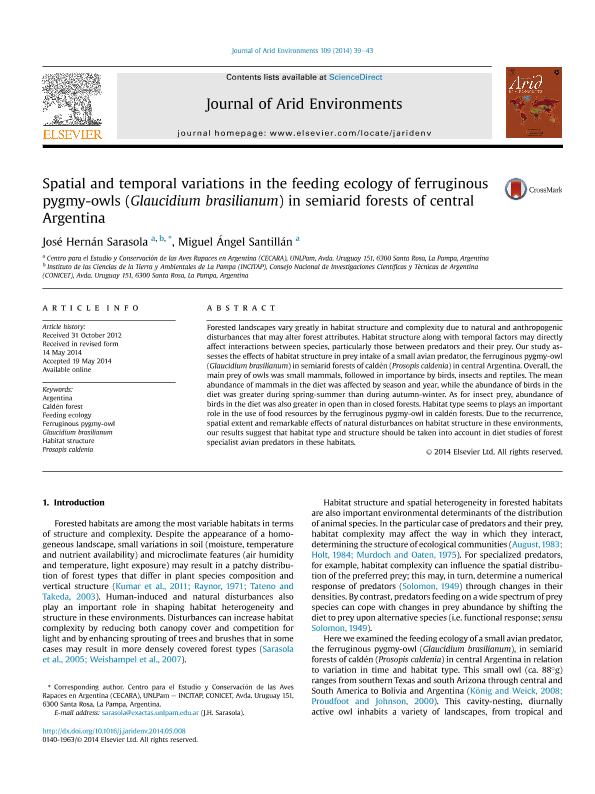Mostrar el registro sencillo del ítem
dc.contributor.author
Sarasola, José Hernán

dc.contributor.author
Santillán, Miguel Ángel

dc.date.available
2019-08-13T19:10:09Z
dc.date.issued
2014-10
dc.identifier.citation
Sarasola, José Hernán; Santillán, Miguel Ángel; Spatial and temporal variations in the feeding ecology of ferruginous pygmy-owls (Glaucidium brasilianum) in semiarid forests of central Argentina; Academic Press Ltd - Elsevier Science Ltd; Journal of Arid Environments; 109; 10-2014; 39-43
dc.identifier.issn
0140-1963
dc.identifier.uri
http://hdl.handle.net/11336/81574
dc.description.abstract
Forested landscapes vary greatly in habitat structure and complexity due to natural and anthropogenic disturbances that may alter forest attributes. Habitat structure along with temporal factors may directly affect interactions between species, particularly those between predators and their prey. Our study assesses the effects of habitat structure in prey intake of a small avian predator, the ferruginous pygmy-owl (Glaucidium brasilianum) in semiarid forests of caldén (Prosopis caldenia) in central Argentina. Overall, the main prey of owls was small mammals, followed in importance by birds, insects and reptiles. The mean abundance of mammals in the diet was affected by season and year, while the abundance of birds in the diet was greater during spring-summer than during autumn-winter. As for insect prey, abundance of birds in the diet was also greater in open than in closed forests. Habitat type seems to plays an important role in the use of food resources by the ferruginous pygmy-owl in caldén forests. Due to the recurrence, spatial extent and remarkable effects of natural disturbances on habitat structure in these environments, our results suggest that habitat type and structure should be taken into account in diet studies of forest specialist avian predators in these habitats.
dc.format
application/pdf
dc.language.iso
eng
dc.publisher
Academic Press Ltd - Elsevier Science Ltd

dc.rights
info:eu-repo/semantics/openAccess
dc.rights.uri
https://creativecommons.org/licenses/by-nc-sa/2.5/ar/
dc.subject
Argentina
dc.subject
Caldén Forest
dc.subject
Feeding Ecology
dc.subject
Ferruginous Pygmy-Owl
dc.subject
Glaucidium Brasilianum
dc.subject
Habitat Structure
dc.subject
Prosopis Caldenia
dc.subject.classification
Zoología, Ornitología, Entomología, Etología

dc.subject.classification
Ciencias Biológicas

dc.subject.classification
CIENCIAS NATURALES Y EXACTAS

dc.title
Spatial and temporal variations in the feeding ecology of ferruginous pygmy-owls (Glaucidium brasilianum) in semiarid forests of central Argentina
dc.type
info:eu-repo/semantics/article
dc.type
info:ar-repo/semantics/artículo
dc.type
info:eu-repo/semantics/publishedVersion
dc.date.updated
2019-08-12T13:40:53Z
dc.journal.volume
109
dc.journal.pagination
39-43
dc.journal.pais
Países Bajos

dc.journal.ciudad
Amsterdam
dc.description.fil
Fil: Sarasola, José Hernán. Consejo Nacional de Investigaciones Científicas y Técnicas. Instituto de Ciencias de la Tierra y Ambientales de La Pampa. Universidad Nacional de La Pampa. Facultad de Ciencias Exactas y Naturales. Instituto de Ciencias de la Tierra y Ambientales de La Pampa; Argentina. Universidad Nacional de La Pampa. Facultad de Ciencia Exactas y Naturales. Departamento de Recursos Naturales. Centro para el Estudio y Conservación de Aves Rapaces; Argentina
dc.description.fil
Fil: Santillán, Miguel Ángel. Universidad Nacional de La Pampa. Facultad de Ciencia Exactas y Naturales. Departamento de Recursos Naturales. Centro para el Estudio y Conservación de Aves Rapaces; Argentina
dc.journal.title
Journal of Arid Environments

dc.relation.alternativeid
info:eu-repo/semantics/altIdentifier/url/https://www.sciencedirect.com/science/article/pii/S0140196314001232
dc.relation.alternativeid
info:eu-repo/semantics/altIdentifier/doi/https://doi.org/10.1016/j.jaridenv.2014.05.008
Archivos asociados
